- Privacy Policy

Home » Future Research – Thesis Guide

Future Research – Thesis Guide
Table of Contents
Future research, also known as recommendations for further study, is an essential section in a thesis that outlines areas where additional investigation is needed. This section acknowledges the limitations of the current research and proposes directions for future inquiry, helping to advance knowledge in the field. By providing well-thought-out suggestions, this component enhances the relevance and value of your study, contributing to the academic and practical understanding of the topic.
This guide explains the importance of the future research section, its key components, how to write it effectively, and examples of well-crafted recommendations.

Future Research
The future research section is where a researcher identifies unresolved issues, gaps, or new questions that arose during their study. It highlights areas that could not be addressed within the scope or limitations of the current research and suggests topics, methods, or perspectives for future scholars to explore.
For example, if your research studied the effects of online learning on high school students, you might suggest future research examining its long-term effects or its impact on different age groups.
Importance of Future Research
- Advancing Knowledge: Encourages the academic community to build upon your work, contributing to a deeper understanding of the topic.
- Addressing Limitations: Acknowledges areas where the current study fell short, providing a starting point for further investigation.
- Fostering Innovation: Suggests novel approaches, methods, or angles that could lead to breakthroughs in the field.
- Improving Practical Applications: Helps practitioners, policymakers, or organizations by highlighting areas that require more evidence or exploration.
Key Components of a Future Research Section
1. acknowledgment of limitations.
Clearly state the limitations of your study that hindered a comprehensive exploration of the topic.
- Example: “This study focused solely on urban schools, which limits its generalizability to rural settings. Further research should examine the impact of online learning in diverse geographic contexts.”
2. Unresolved Questions
Identify questions that your research could not address but are crucial for understanding the topic more fully.
- Example: “While this study found a correlation between social media use and self-esteem, the causality remains unclear. Future research should explore this relationship using experimental designs.”
3. Suggestions for Different Methods
Recommend alternative methodologies that could yield different or more comprehensive insights.
- Example: “This study employed qualitative interviews. Quantitative surveys with a larger sample size could provide more generalizable findings.”
4. New Variables or Perspectives
Propose additional variables, factors, or perspectives that future researchers could investigate.
- Example: “Future research could examine how cultural differences influence the effectiveness of remote work policies.”
5. Longitudinal Studies
Suggest exploring the long-term impacts or trends related to your topic.
- Example: “A longitudinal study tracking students’ academic performance over five years would provide valuable insights into the lasting effects of online learning.”
How to Write the Future Research Section
Step 1: reflect on study limitations.
Review your research process and results to identify areas that were constrained by time, resources, or methodology. Use these limitations as a basis for recommendations.
Step 2: Identify Gaps and Unanswered Questions
Pinpoint aspects of the topic that remain unexplored or unresolved, either from your findings or existing literature.
Step 3: Propose Specific Research Directions
Provide clear and actionable suggestions, ensuring they are relevant to your field and build upon your work.
Step 4: Justify Recommendations
Explain why the suggested research is necessary and how it could contribute to the field.
Step 5: Use Professional Language
Maintain an academic tone, avoiding vague or overly broad suggestions. Be concise yet specific.
Examples of Future Research Recommendations
1. education.
Study Topic: The Impact of Online Learning on Student Engagement Future Research Suggestions: “Future research should examine the long-term effects of online learning on academic achievement across various age groups. Additionally, studies could investigate the role of parental involvement in mitigating the challenges of remote education.”
2. Healthcare
Study Topic: The Effectiveness of Telemedicine in Rural Areas Future Research Suggestions: “This study focused on patient satisfaction with telemedicine services. Future research should explore its impact on clinical outcomes and healthcare cost reduction. Furthermore, investigating the barriers to telemedicine adoption in underserved communities would provide valuable insights.”
3. Environmental Studies
Study Topic: Renewable Energy Adoption in Urban Areas Future Research Suggestions: “Further research could analyze the economic feasibility of renewable energy adoption in rural settings. Comparative studies across regions with varying levels of policy support would also help identify key drivers of success.”
4. Business
Study Topic: The Role of AI in Enhancing Customer Experience Future Research Suggestions: “Future studies could focus on the ethical implications of AI in customer interactions and its impact on customer trust. Longitudinal research examining how AI adoption evolves in small versus large businesses would also be valuable.”
Tips for Writing an Effective Future Research Section
- Be Specific: Avoid vague or general statements. Provide clear and actionable suggestions.
- Align with Study Findings: Ensure your recommendations build logically on your results and limitations.
- Consider Feasibility: Propose research directions that are practical and achievable within the field.
- Emphasize Significance: Highlight the potential impact and importance of the proposed research.
- Avoid Redundancy: Do not repeat ideas already covered in other sections of your thesis.
Common Pitfalls to Avoid
- Overly Broad Recommendations: Suggestions that are too general lack value and direction.
- Neglecting Feasibility: Avoid proposing research that is impractical or unrealistic within the field.
- Ignoring Context: Ensure your suggestions are relevant to the scope of your study and field of inquiry.
- Unclear Justifications: Failing to explain why future research is necessary weakens the recommendations.
The future research section is a vital component of a thesis, helping to guide the academic community and practitioners toward further exploration and innovation. By identifying gaps, addressing limitations, and proposing actionable directions, this section contributes to the ongoing growth of knowledge in your field. Crafting a well-thought-out future research section not only enhances the value of your thesis but also establishes your work as a stepping stone for others in the academic journey.
- Creswell, J. W. (2018). Research Design: Qualitative, Quantitative, and Mixed Methods Approaches . Sage Publications.
- Flick, U. (2018). An Introduction to Qualitative Research . Sage Publications.
- Bryman, A. (2016). Social Research Methods . Oxford University Press.
- Babbie, E. (2020). The Practice of Social Research . Cengage Learning.
- Booth, W. C., Colomb, G. G., & Williams, J. M. (2016). The Craft of Research . University of Chicago Press.
About the author
Muhammad Hassan
Researcher, Academic Writer, Web developer
You may also like

Context of the Study – Writing Guide and Examples

Research Paper Conclusion – Writing Guide and...

Literature Review – Types Writing Guide and...

Figures in Research Paper – Examples and Guide

Dissertation – Format, Example and Template

Delimitations in Research – Types, Examples and...

Suggestions for Future Research
Your dissertation needs to include suggestions for future research. Depending on requirements of your university, suggestions for future research can be either integrated into Research Limitations section or it can be a separate section.
You will need to propose 4-5 suggestions for future studies and these can include the following:
1. Building upon findings of your research . These may relate to findings of your study that you did not anticipate. Moreover, you may suggest future research to address unanswered aspects of your research problem.
2. Addressing limitations of your research . Your research will not be free from limitations and these may relate to formulation of research aim and objectives, application of data collection method, sample size, scope of discussions and analysis etc. You can propose future research suggestions that address the limitations of your study.
3. Constructing the same research in a new context, location and/or culture . It is most likely that you have addressed your research problem within the settings of specific context, location and/or culture. Accordingly, you can propose future studies that can address the same research problem in a different settings, context, location and/or culture.
4. Re-assessing and expanding theory, framework or model you have addressed in your research . Future studies can address the effects of specific event, emergence of a new theory or evidence and/or other recent phenomenon on your research problem.
My e-book, The Ultimate Guide to Writing a Dissertation in Business Studies: a step by step assistance offers practical assistance to complete a dissertation with minimum or no stress. The e-book covers all stages of writing a dissertation starting from the selection to the research area to submitting the completed version of the work within the deadline. John Dudovskiy
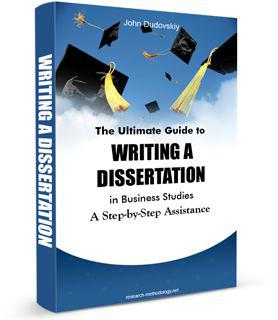
- Call for Articles
- Login

Research Recommendations – Guiding policy-makers for evidence-based decision making
Research recommendations play a crucial role in guiding scholars and researchers toward fruitful avenues of exploration. In an era marked by rapid technological advancements and an ever-expanding knowledge base, refining the process of generating research recommendations becomes imperative.
But, what is a research recommendation?
Research recommendations are suggestions or advice provided to researchers to guide their study on a specific topic . They are typically given by experts in the field. Research recommendations are more action-oriented and provide specific guidance for decision-makers, unlike implications that are broader and focus on the broader significance and consequences of the research findings. However, both are crucial components of a research study.
Difference Between Research Recommendations and Implication
Although research recommendations and implications are distinct components of a research study, they are closely related. The differences between them are as follows:
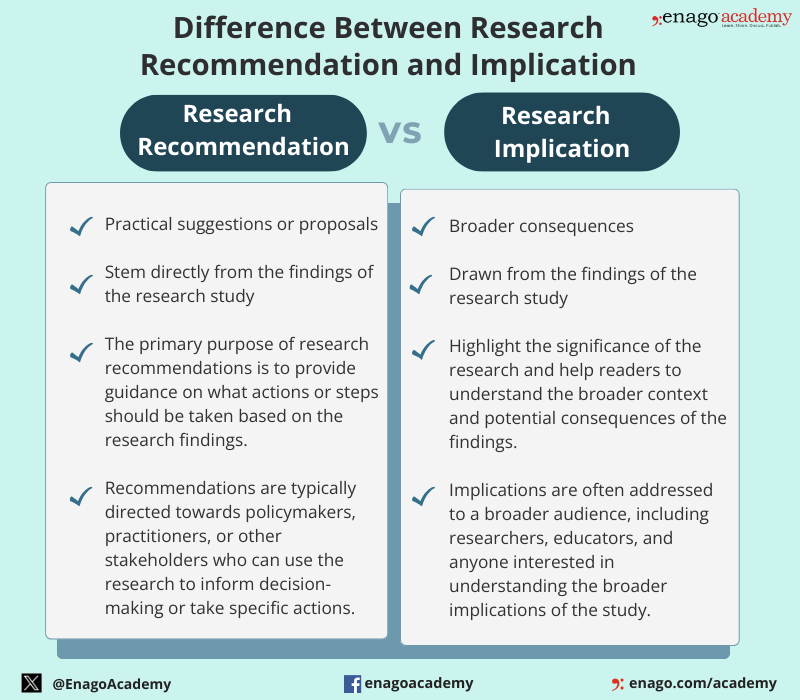
Types of Research Recommendations
Recommendations in research can take various forms, which are as follows:
These recommendations aim to assist researchers in navigating the vast landscape of academic knowledge.
Let us dive deeper to know about its key components and the steps to write an impactful research recommendation.
Key Components of Research Recommendations
The key components of research recommendations include defining the research question or objective, specifying research methods, outlining data collection and analysis processes, presenting results and conclusions, addressing limitations, and suggesting areas for future research. Here are some characteristics of research recommendations:
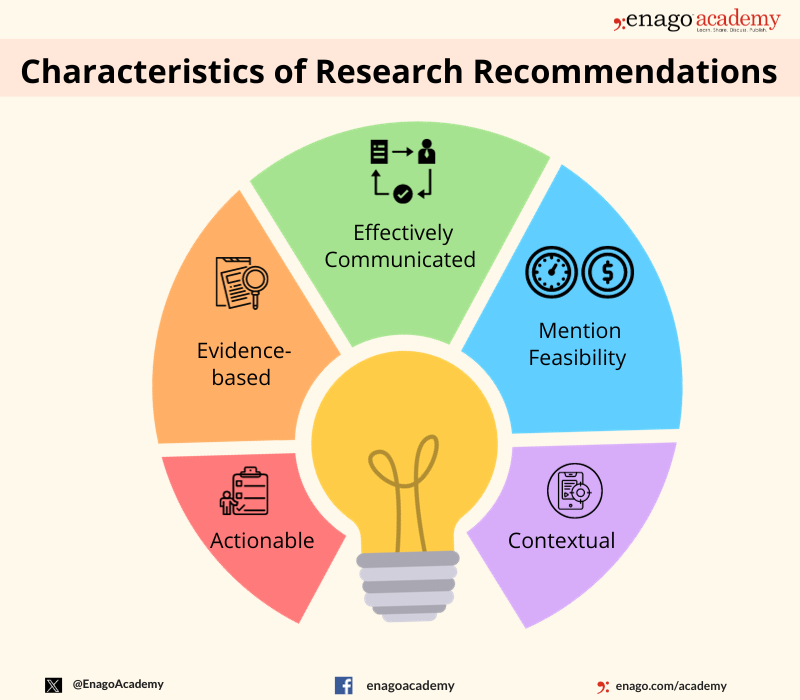
Research recommendations offer various advantages and play a crucial role in ensuring that research findings contribute to positive outcomes in various fields. However, they also have few limitations which highlights the significance of a well-crafted research recommendation in offering the promised advantages.
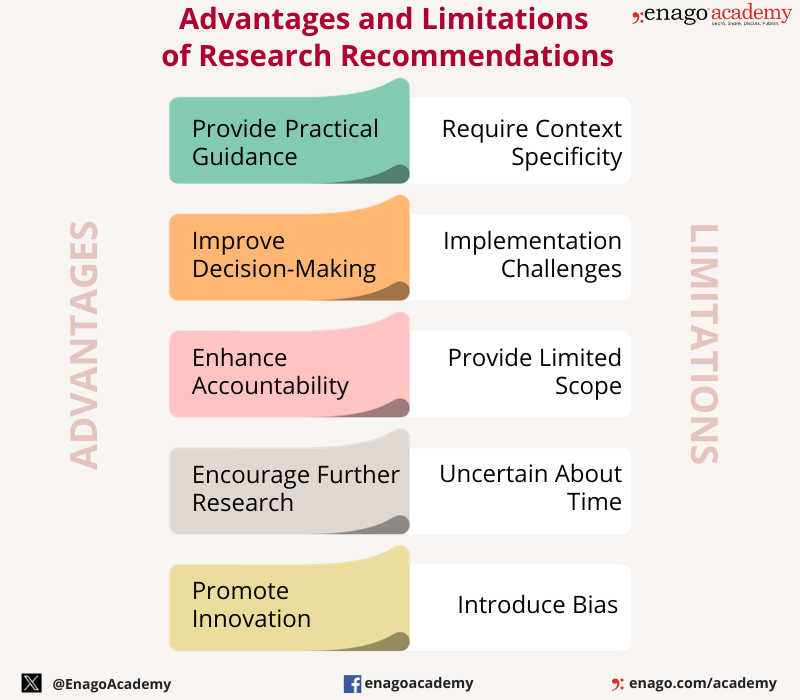
The importance of research recommendations ranges in various fields, influencing policy-making, program development, product development, marketing strategies, medical practice, and scientific research. Their purpose is to transfer knowledge from researchers to practitioners, policymakers, or stakeholders, facilitating informed decision-making and improving outcomes in different domains.
How to Write Research Recommendations?
Research recommendations can be generated through various means, including algorithmic approaches, expert opinions, or collaborative filtering techniques. Here is a step-wise guide to build your understanding on the development of research recommendations.
1. Understand the Research Question:
Understand the research question and objectives before writing recommendations. Also, ensure that your recommendations are relevant and directly address the goals of the study.
2. Review Existing Literature:
Familiarize yourself with relevant existing literature to help you identify gaps , and offer informed recommendations that contribute to the existing body of research.
3. Consider Research Methods:
Evaluate the appropriateness of different research methods in addressing the research question. Also, consider the nature of the data, the study design, and the specific objectives.
4. Identify Data Collection Techniques:
Gather dataset from diverse authentic sources. Include information such as keywords, abstracts, authors, publication dates, and citation metrics to provide a rich foundation for analysis.
5. Propose Data Analysis Methods:
Suggest appropriate data analysis methods based on the type of data collected. Consider whether statistical analysis, qualitative analysis, or a mixed-methods approach is most suitable.
6. Consider Limitations and Ethical Considerations:
Acknowledge any limitations and potential ethical considerations of the study. Furthermore, address these limitations or mitigate ethical concerns to ensure responsible research.
7. Justify Recommendations:
Explain how your recommendation contributes to addressing the research question or objective. Provide a strong rationale to help researchers understand the importance of following your suggestions.
8. Summarize Recommendations:
Provide a concise summary at the end of the report to emphasize how following these recommendations will contribute to the overall success of the research project.
By following these steps, you can create research recommendations that are actionable and contribute meaningfully to the success of the research project.
Download now to unlock some tips to improve your journey of writing research recommendations.
Example of a Research Recommendation
Here is an example of a research recommendation based on a hypothetical research to improve your understanding.
Research Recommendation: Enhancing Student Learning through Integrated Learning Platforms
Background:
The research study investigated the impact of an integrated learning platform on student learning outcomes in high school mathematics classes. The findings revealed a statistically significant improvement in student performance and engagement when compared to traditional teaching methods.
Recommendation:
In light of the research findings, it is recommended that educational institutions consider adopting and integrating the identified learning platform into their mathematics curriculum. The following specific recommendations are provided:
- Implementation of the Integrated Learning Platform:
Schools are encouraged to adopt the integrated learning platform in mathematics classrooms, ensuring proper training for teachers on its effective utilization.
- Professional Development for Educators:
Develop and implement professional programs to train educators in the effective use of the integrated learning platform to address any challenges teachers may face during the transition.
- Monitoring and Evaluation:
Establish a monitoring and evaluation system to track the impact of the integrated learning platform on student performance over time.
- Resource Allocation:
Allocate sufficient resources, both financial and technical, to support the widespread implementation of the integrated learning platform.
By implementing these recommendations, educational institutions can harness the potential of the integrated learning platform and enhance student learning experiences and academic achievements in mathematics.
This example covers the components of a research recommendation, providing specific actions based on the research findings, identifying the target audience, and outlining practical steps for implementation.
Using AI in Research Recommendation Writing
Enhancing research recommendations is an ongoing endeavor that requires the integration of cutting-edge technologies, collaborative efforts, and ethical considerations. By embracing data-driven approaches and leveraging advanced technologies, the research community can create more effective and personalized recommendation systems. However, it is accompanied by several limitations. Therefore, it is essential to approach the use of AI in research with a critical mindset, and complement its capabilities with human expertise and judgment.
Here are some limitations of integrating AI in writing research recommendation and some ways on how to counter them.
1. Data Bias
AI systems rely heavily on data for training. If the training data is biased or incomplete, the AI model may produce biased results or recommendations.
How to tackle: Audit regularly the model’s performance to identify any discrepancies and adjust the training data and algorithms accordingly.
2. Lack of Understanding of Context:
AI models may struggle to understand the nuanced context of a particular research problem. They may misinterpret information, leading to inaccurate recommendations.
How to tackle: Use AI to characterize research articles and topics. Employ them to extract features like keywords, authorship patterns and content-based details.
3. Ethical Considerations:
AI models might stereotype certain concepts or generate recommendations that could have negative consequences for certain individuals or groups.
How to tackle: Incorporate user feedback mechanisms to reduce redundancies. Establish an ethics review process for AI models in research recommendation writing.
4. Lack of Creativity and Intuition:
AI may struggle with tasks that require a deep understanding of the underlying principles or the ability to think outside the box.
How to tackle: Hybrid approaches can be employed by integrating AI in data analysis and identifying patterns for accelerating the data interpretation process.
5. Interpretability:
Many AI models, especially complex deep learning models, lack transparency on how the model arrived at a particular recommendation.
How to tackle: Implement models like decision trees or linear models. Provide clear explanation of the model architecture, training process, and decision-making criteria.
6. Dynamic Nature of Research:
Research fields are dynamic, and new information is constantly emerging. AI models may struggle to keep up with the rapidly changing landscape and may not be able to adapt to new developments.
How to tackle: Establish a feedback loop for continuous improvement. Regularly update the recommendation system based on user feedback and emerging research trends.
The integration of AI in research recommendation writing holds great promise for advancing knowledge and streamlining the research process. However, navigating these concerns is pivotal in ensuring the responsible deployment of these technologies. Researchers need to understand the use of responsible use of AI in research and must be aware of the ethical considerations.
Exploring research recommendations plays a critical role in shaping the trajectory of scientific inquiry. It serves as a compass, guiding researchers toward more robust methodologies, collaborative endeavors, and innovative approaches. Embracing these suggestions not only enhances the quality of individual studies but also contributes to the collective advancement of human understanding.
Frequently Asked Questions
The purpose of recommendations in research is to provide practical and actionable suggestions based on the study's findings, guiding future actions, policies, or interventions in a specific field or context. Recommendations bridges the gap between research outcomes and their real-world application.
To make a research recommendation, analyze your findings, identify key insights, and propose specific, evidence-based actions. Include the relevance of the recommendations to the study's objectives and provide practical steps for implementation.
Begin a recommendation by succinctly summarizing the key findings of the research. Clearly state the purpose of the recommendation and its intended impact. Use a direct and actionable language to convey the suggested course of action.
Rate this article Cancel Reply
Your email address will not be published.

Enago Academy's Most Popular Articles

- Promoting Research
Graphical Abstracts Vs. Infographics: Best practices for using visual illustrations for increased research impact
Dr. Sarah Chen stared at her computer screen, her eyes staring at her recently published…

- Publishing Research
10 Tips to Prevent Research Papers From Being Retracted
Research paper retractions represent a critical event in the scientific community. When a published article…
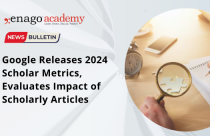
- Industry News
Google Releases 2024 Scholar Metrics, Evaluates Impact of Scholarly Articles
Google has released its 2024 Scholar Metrics, assessing scholarly articles from 2019 to 2023. This…

- Career Corner
- Reporting Research
How to Create a Poster That Stands Out: Tips for a smooth poster presentation
It was the conference season. Judy was excited to present her first poster! She had…

- Diversity and Inclusion
6 Reasons Why There is a Decline in Higher Education Enrollment: Action plan to overcome this crisis
Over the past decade, colleges and universities across the globe have witnessed a concerning trend…
Academic Essay Writing Made Simple: 4 types and tips
How to Effectively Cite a PDF (APA, MLA, AMA, and Chicago Style)
How to Optimize Your Research Process: A step-by-step guide

Sign-up to read more
Subscribe for free to get unrestricted access to all our resources on research writing and academic publishing including:
- 2000+ blog articles
- 50+ Webinars
- 10+ Expert podcasts
- 50+ Infographics
- 10+ Checklists
- Research Guides
We hate spam too. We promise to protect your privacy and never spam you.
- Plagiarism Checker
- AI Content Detector
- Academic Editing
- Publication Support Services
- Thesis Editing
- Enago Reports
- Journal Finder
- Thought Leadership
- Al in Academia
- Other Resources
- Infographics
- Enago Learn
- On-Demand Webinar
- Open Access Week
- Peer Review Week
- Publication Integrity Week
- Conference Videos
- Call for speakers
- Author Training
I am looking for Editing/ Proofreading services for my manuscript Tentative date of next journal submission:

What features do you prefer in a plagiarism detector? (Select all that apply)
- How it works
"Christmas Offer"
Terms & conditions.
As the Christmas season is upon us, we find ourselves reflecting on the past year and those who we have helped to shape their future. It’s been quite a year for us all! The end of the year brings no greater joy than the opportunity to express to you Christmas greetings and good wishes.
At this special time of year, Research Prospect brings joyful discount of 10% on all its services. May your Christmas and New Year be filled with joy.
We are looking back with appreciation for your loyalty and looking forward to moving into the New Year together.
"Claim this offer"
In unfamiliar and hard times, we have stuck by you. This Christmas, Research Prospect brings you all the joy with exciting discount of 10% on all its services.
Offer valid till 5-1-2024
We love being your partner in success. We know you have been working hard lately, take a break this holiday season to spend time with your loved ones while we make sure you succeed in your academics
Discount code: RP0996Y

Your content here...

How To Write Recommendations In A Research Study
Published by Alvin Nicolas at July 12th, 2024 , Revised On July 12, 2024
The ultimate goal of any research process is not just to gather knowledge, but to use that knowledge to make a positive impact. This is where recommendations come in. A well-written recommendations section in your research study translates your findings into actionable steps and guides future research on the topic.
This blog is your ultimate guide to understanding how to write recommendations in a research study. But before that, let’s see what is recommendation in research.
What Is Recommendation In Research
In a research study, the recommendation section refers to a suggested course of action based on the findings of your research . It acts as a bridge between the knowledge you gained and its practical implications.
Recommendations take your research results and propose concrete steps on how to use them to address a problem or improve a situation. Moreover, you can suggest new avenues and guide future research in building upon your work. This will improve the credibility of your research. For studies that include real-world implications, recommendations are a great way to provide evidence-based suggestions for policymakers or practitioners to consider.
Difference Between Research Recommendations and Implication
Research recommendations and implications often confuse researchers. They cannot easily differentiate between the two. Here is how they are different.
Where To Add Recommendations
Recommendations are mostly part of your conclusion and discussion sections. If you are writing a practical dissertation , you can include a separate section for your recommendations.
Types of Research Recommendations
There are different forms of recommendations in research. Some of them include the following.
How To Construct The Recommendations Section
There are different ways in which different scholars write the recommendations section. A general observation is a research question → conclusion → recommendation.
The following example will help you understand this better.
Research Question
How can the education of mothers impact the social skills of kindergarten children?
The role of mothers is a significant contributor towards the social skills of children. From an early age, kids tend to observe how their mother interacts with others and follow in her footsteps initially. Therefore, mothers should be educated and interact with good demeanour if they want their children to have excellent social skills.
Recommendation
The study revealed that a mother’s education plays an important role in building the social skills of children on kindergarten level. Future research could explore how the same continues in junior school level children.
How To Write Recommendations In Research
Now that you are familiar with the definition and types, here is a step-by-step guide on how to write a recommendation in research.
Step 1: Revisit Your Research Goals
Before doing anything else, you have to remind yourself of the objectives that you set out to achieve in your research. It allows you to match your recommendations directly to your research questions and see if you made any contribution to your goals.
Step 2: Analyse Your Findings
You have to examine your data and identify your key results. This analysis forms the foundation for your recommendations. Look for patterns and unexpected findings that might suggest new areas for other researchers to explore.
Step 3: Consider The Research Methods
Ask these questions from yourself: were the research methods effective? Is there any other way that would have been better to perform this research, or were there any limitations associated with the research methods?
Step 4: Prioritise Recommendations
You might have a lot of recommendations in mind, but all are not equal. You have to consider the impact and feasibility of each suggestion. Prioritise these recommendations, while remaining realistic about implementation.
Step 5: Write Actionable Statements
Do not be vague when crafting statements. Instead, you have to use clear and concise language that outlines specific actions. For example, if you want to say “improve education practices,” you could write “implement a teacher training program” for better clarity.
Step 6: Provide Evidence
You cannot just make suggestions out of thin air, and have to ground them in the evidence you have gathered through your research. Moreover, cite relevant data or findings from your study or previous literature to support your recommendations.
Step 7: Address Challenges
There are always some limitations related to the research at hand. As a researcher, it is your duty to highlight and address any challenges faced or what might occur in the future.
Tips For Writing The Perfect Recommendation In Research
Use these tips to write the perfect recommendation in your research.
- Be Concise – Write recommendations in a clear and concise language. Use one sentence statements to look more professional.
- Be Logical & Coherent – You can use lists and headings according to the requirements of your university.
- Tailor According To Your Readers – You have to aim your recommendations to a specific audience and colleagues in the field of study.
- Provide Specific Suggestions – Offer specific measures and solutions to the issues, and focus on actionable suggestions.
- Match Recommendations To Your Conclusion – You have to align your recommendations with your conclusion.
- Consider Limitations – Use critical thinking to see how limitations may impact the feasibility of your solutions.
- End With A Summary – You have to add a small conclusion to highlight suggestions and their impact.
Example Of Recommendation In Research
Context of the study:
This research studies how effective e-learning platforms are for adult language learners compared to traditional classroom instruction. The findings suggest that e-learning platforms can be just as effective as traditional classrooms in improving language proficiency.
Research Recommendation Sample
Language educators can incorporate e-learning tools into existing curriculums to provide learners with more flexibility. Additionally, they can develop training programs for educators on how to integrate e-learning platforms into their teaching practices.
E-learning platform developers should focus on e-learning platforms that are interactive and cater to different learning styles. They can also invest in features that promote learner autonomy and self-directed learning.
Future researchers can further explore the long-term effects of e-learning on language acquisition to provide insights into whether e-learning can support sustained language development.
Frequently Asked Questions
How to write recommendations in a research paper.
- Revisit your research goals
- Analyse your findings
- Consider the research methods
- Prioritise recommendations
- Write actionable statements
- Provide evidence
- Address challenges
How to present recommendations in research?
- Be concise
- Write logical and coherent
- Match recommendations to conclusion
- Ensure your recommendations are achievable
What to write in recommendation in research?
Your recommendation has to be concrete and specific and support the research with a clear rationale. Moreover, it should be connected directly to your research. Your recommendations, however, should not undermine your own work or use self-criticism.
You May Also Like
A list of glossary in a dissertation contains all the terms that were used in your dissertation but the meanings of which may not be obvious to the readers.
Make sure to develop a conceptual framework before conducting research. Here is all you need to know about what is a conceptual framework is in a dissertation?
Make sure that your selected topic is intriguing, manageable, and relevant. Here are some guidelines to help understand how to find a good dissertation topic.
As Featured On

USEFUL LINKS
LEARNING RESOURCES

COMPANY DETAILS

Splash Sol LLC
- How It Works
Educational resources and simple solutions for your research journey

What are Implications and Recommendations in Research? How to Write It, with Examples
Highly cited research articles often contain both implications and recommendations , but there is often some confusion around the difference between implications and recommendations in research. Implications of a study are the impact your research makes in your chosen area; they discuss how the findings of the study may be important to justify further exploration of your research topic. Research recommendations suggest future actions or subsequent steps supported by your research findings. It helps to improve your field of research or cross-disciplinary fields through future research or provides frameworks for decision-makers or policymakers. Recommendations are the action plan you propose based on the outcome.
In this article, we aim to simplify these concepts for researchers by providing key insights on the following:
- what are implications in research
- what is recommendation in research
- differences between implications and recommendations
- how to write implications in research
- how to write recommendation in research
- sample recommendation in research

Table of Contents
What are implications in research
The implications in research explain what the findings of the study mean to researchers or to certain subgroups or populations beyond the basic interpretation of results. Even if your findings fail to bring radical or disruptive changes to existing ways of doing things, they might have important implications for future research studies. For example, your proposed method for operating remote-controlled robots could be more precise, efficient, or cheaper than existing methods, or the remote-controlled robot could be used in other application areas. This could enable more researchers to study a specific problem or open up new research opportunities.
Implications in research inform how the findings, drawn from your results, may be important for and impact policy, practice, theory, and subsequent research. Implications may be theoretical or practical. 1
- Practical implications are potential values of the study with practical or real outcomes . Determining the practical implications of several solutions can aid in identifying optimal solution results. For example, clinical research or research on classroom learning mostly has practical implications in research . If you developed a new teaching method, the implication would be how teachers can use that method based on your findings.
- Theoretical implications in research constitute additions to existing theories or establish new theories. These types of implications in research characterize the ability of research to influence society in apparent ways. It is, at most, an educated guess (theoretical) about the possible implication of action and need not be as absolute as practical implications in research . If your study supported the tested theory, the theoretical implication would be that the theory can explain the investigated phenomenon. Else, your study may serve as a basis for modifying the theory. Theories may be partially supported as well, implying further study of the theory or necessary modifications are required.

What are recommendations in research?
Recommendations in research can be considered an important segment of the analysis phase. Recommendations allow you to suggest specific interventions or strategies to address the issues and constraints identified through your study. It responds to key findings arrived at through data collection and analysis. A process of prioritization can help you narrow down important findings for which recommendations are developed.
Recommendations in research examples
Recommendations in research may vary depending on the purpose or beneficiary as seen in the table below.
Table: Recommendations in research examples based on purpose and beneficiary
If you’re wondering how to make recommendations in research . You can use the simple recommendation in research example below as a handy template.
Table: Sample recommendation in research template

Basic differences between implications and recommendations in research
Implications and recommendations in research are two important aspects of a research paper or your thesis or dissertation. Implications discuss the importance of the research findings, while recommendations offer specific actions to solve a problem. So, the basic difference between the two is in their function and the questions asked to achieve it. The following table highlights the main differences between implications and recommendations in research .
Table: Differences between implications and recommendations in research
Where do implications go in your research paper.
Because the implications and recommendations of the research are based on study findings, both are usually written after the completion of a study. There is no specific section dedicated to implications in research ; they are usually integrated into the discussion section adding evidence as to why the results are meaningful and what they add to the field. Implications can be written after summarizing your main findings and before the recommendations and conclusion.
Implications can also be presented in the conclusion section after a short summary of the study results.

How to write implications in research
Implication means something that is inferred. The implications of your research are derived from the importance of your work and how it will impact future research. It is based on how previous studies have advanced your field and how your study can add to that.
When figuring out how to write implications in research , a good strategy is to separate it into the different types of implications in research , such as social, political, technological, policy-related, or others. As mentioned earlier, the most frequently used are the theoretical and practical implications.
Next, you need to ask, “Who will benefit the most from reading my paper?” Is it policymakers, physicians, the public, or other researchers? Once you know your target population, explain how your findings can help them.
The implication section can include a paragraph or two that asserts the practical or managerial implications and links it to the study findings. A discussion can then follow, demonstrating that the findings can be practically implemented or how they will benefit a specific audience. The writer is given a specific degree of freedom when writing research implications , depending on the type of implication in research you want to discuss: practical or theoretical. Each is discussed differently, using different words or in separate sections. The implications can be based on how the findings in your study are similar or dissimilar to that in previous studies. Your study may reaffirm or disprove the results of other studies, which has important implications in research . You can also suggest future research directions in the light of your findings or require further research to confirm your findings, which are all crucial implications. Most importantly, ensure the implications in research are specific and that your tone reflects the strength of your findings without exaggerating your results.
Implications in research can begin with the following specific sentence structures:
- These findings suggest that…
- These results build on existing body of evidence of…
- These results should be considered when…
- While previous research focused on x, our results show that y…

What should recommendations in research look like?
Recommendations for future research should be:
- Directly related to your research question or findings
- Concrete and specific
- Supported by a clear reasoning
The recommendations in research can be based on the following factors:
1. Beneficiary: A paper’s research contribution may be aimed at single or multiple beneficiaries, based on which recommendations can vary. For instance, if your research is about the quality of care in hospitals, the research recommendation to different beneficiaries might be as follows:
- Nursing staff: Staff should undergo training to enhance their understanding of what quality of care entails.
- Health science educators: Educators must design training modules that address quality-related issues in the hospital.
- Hospital management: Develop policies that will increase staff participation in training related to health science.
2. Limitations: The best way to figure out what to include in your research recommendations is to understand the limitations of your study. It could be based on factors that you have overlooked or could not consider in your present study. Accordingly, the researcher can recommend that other researchers approach the problem from a different perspective, dimension, or methodology. For example, research into the quality of care in hospitals can be based on quantitative data. The researcher can then recommend a qualitative study of factors influencing the quality of care, or they can suggest investigating the problem from the perspective of patients rather than the healthcare providers.
3. Theory or Practice: Your recommendations in research could be implementation-oriented or further research-oriented.
4. Your research: Research recommendations can be based on your topic, research objectives, literature review, and analysis, or evidence collected. For example, if your data points to the role of faculty involvement in developing effective programs, recommendations in research can include developing policies to increase faculty participation. Take a look at the evidence-based recommendation in research example s provided below.
Table: Example of evidence-based research recommendation
Avoid making the following mistakes when writing research recommendations :
- Don’t undermine your own work: Recommendations in research should offer suggestions on how future studies can be built upon the current study as a natural extension of your work and not as an entirely new field of research.
- Support your study arguments: Ensure that your research findings stand alone on their own merits to showcase the strength of your research paper.
How to write recommendations in research
When writing research recommendations , your focus should be on highlighting what additional work can be done in that field. It gives direction to researchers, industries, or governments about changes or developments possible in this field. For example, recommendations in research can include practical and obtainable strategies offering suggestions to academia to address problems. It can also be a framework that helps government agencies in developing strategic or long-term plans for timely actions against disasters or aid nation-building.
There are a few SMART 2 things to remember when writing recommendations in research. Your recommendations must be:
- S pecific: Clearly state how challenges can be addressed for better outcomes and include an action plan that shows what can be achieved.
- M easurable: Use verbs denoting measurable outcomes, such as identify, analyze, design, compute, assess, evaluate, revise, plan, etc., to strengthen recommendations in research .
- A ttainable: Recommendations should offer a solution-oriented approach to problem-solving and must be written in a way that is easy to follow.
- R elevant: Research recommendations should be reasonable, realistic, and result-based. Make sure to suggest future possibilities for your research field.
- T imely: Time-based or time-sensitive recommendations in research help divide the action plan into long-term or short-term (immediate) goals. A timeline can also inform potential readers of what developments should occur over time.
If you are wondering how many words to include in your research recommendation , a general rule of thumb would be to set aside 5% of the total word count for writing research recommendations . Finally, when writing the research implications and recommendations , stick to the facts and avoid overstating or over-generalizing the study findings. Both should be supported by evidence gathered through your data analysis.
References:
- Schmidt, F. L., & Hunter, J. E. (1998). The validity and utility of selection methods in personnel psychology: Practical and theoretical implications of 85 years of research findings. Psychological bulletin , 124 (2), 262.
- Doran, G. T. (1981). There’s a S.M.A.R.T. way to write management’s goals and objectives. Manag Rev , 70 (11), 35-36.
Editage All Access is a subscription-based platform that unifies the best AI tools and services designed to speed up, simplify, and streamline every step of a researcher’s journey. The Editage All Access Pack is a one-of-a-kind subscription that unlocks full access to an AI writing assistant, literature recommender, journal finder, scientific illustration tool, and exclusive discounts on professional publication services from Editage.
Based on 22+ years of experience in academia, Editage All Access empowers researchers to put their best research forward and move closer to success. Explore our top AI Tools pack, AI Tools + Publication Services pack, or Build Your Own Plan. Find everything a researcher needs to succeed, all in one place – Get All Access now starting at just $14 a month !
Related Posts

What is Experimental Research Design? Definition, Examples, and Types of Designs

4 Types of Essays in Academic Writing

How to write recommendations in research?
12 June 2024
Magda Wojcik
Recommendations in research play a crucial role in translating research findings into actionable insights that can influence real-world practices and policy decisions. Understanding how to write and use recommendations effectively is essential for researchers, practitioners and policymakers.
Read this comprehensive guide to explore the significance of recommendations in research and the key components of writing effective recommendations and learn practical tips and examples to help you enhance the impact of your research.
What are recommendations in research?
Research recommendations vs research implications, types of research recommendations.
- Key components of research recommendations
Tips for writing research recommendations
Examples of research recommendations, using professional editing services to enhance research recommendations, resources for writing recommendations in research.
The recommendations in research papers and other academic texts are essential element of academic writing. In these, academic researchers provide actionable suggestions based on the study’s findings. This section is essential for translating research results into practical applications, policy changes or directions for future research.
The recommendations section in research papers and other academic texts serves multiple critical purposes and holds significant importance. Primarily, this section suggests how the findings can be applied in real-world scenarios. In turn, this helps practitioners and professionals implement new strategies, techniques or interventions. For instance, a study on teaching methods might recommend incorporating specific techniques into classroom practices to improve student engagement and learning outcomes. Additionally, this section advises policymakers on potential changes or considerations, influencing public policy by providing evidence-based suggestions that can lead to societal benefits. For example, research on environmental policies might recommend specific regulatory changes to reduce pollution and mitigate climate change effects.
The recommendations also identify gaps and suggest areas for further investigation. They will guide future researchers by highlighting unexplored areas, thus advancing the field of study. A study on a new medical treatment, for example, might suggest further research on long-term effects and broader demographic applications. Moreover, the recommendations section acknowledges the study’s limitations. It proposes ways to address them in future research, enhancing the reliability and validity of subsequent studies. For instance, if a study had a small sample size, the recommendation might be to conduct the research with a larger, more diverse population in future studies.
The recommendations section provides actionable insights that professionals can use to improve practices and outcomes. This guidance is crucial for educators, healthcare providers, policymakers and other practitioners who can use these recommendations to implement effective strategies and policies. Furthermore, offering evidence-based suggestions for policy decisions can lead to significant societal benefits. For instance, they may include shaping public health initiatives and improving health outcomes. Identifying promising areas for future study helps advance knowledge by guiding scientists to explore recommended areas and fill knowledge gaps. By placing the study in context and acknowledging its limitations, the recommendations make conclusions more reliable, thus improving the overall quality of research.
Research recommendations and implications are two distinct sections in academic writing that serve different purposes. Both sections are crucial for contextualising the research findings. Recommendations provide a roadmap for future actions and practical applications. In contrast, implications offer an understanding of the study’s broader impact on theory, practice and policy. Together they help bridge the gap between research and its application, ensuring that findings are understood and utilised effectively.
The recommendations section in research papers provides specific, actionable suggestions based on the study’s findings. These recommendations are aimed at practitioners, policymakers and researchers who will take direct action. They focus on future-oriented steps and often include practical applications, policy changes and suggestions for further research. For instance, if a study finds that a particular teaching method improves student engagement, the recommendation might be to implement this method across schools and conduct further research on its long-term effects.
On the other hand, the implications section explains the significance of the study’s findings and their broader impact . This section helps the academic audience understand the theoretical, practical and policy-related consequences of the research. For example, it might have implications of a study on environmental policies suggesting such regulations can effectively reduce pollution, thereby influencing future policy decisions.
Recommendations vs implications: Key differences summarised
There are six types of research recommendations:
- theoretical
- methodological
- educational
Each serves a distinct purpose in guiding future work, practical applications, policy-making and academic discourse.
Practical recommendations
Practical recommendations provide actionable suggestions that can be directly implemented in practice . For instance, they may recommend adopting specific teaching methods in education or suggesting new clinical protocols in health care. These recommendations are based on empirical findings that demonstrate clear benefits or improvements.
Policy recommendations
Policy recommendations aim to influence policymakers by suggesting changes or considerations based on research evidence . For example, researchers might propose new environmental regulations to address issues identified in their studies. These recommendations are grounded in evidence indicating the potential for policy changes to produce positive outcomes.
Research recommendations
Research recommendations identify areas for further study and highlight gaps in current knowledge . These recommendations might suggest longitudinal studies to examine the long-term effects of an intervention or recommend replication studies in different contexts or with larger samples. They are often based on the limitations and scope of the current research, pointing out what remains unknown.
Theoretical recommendations
Theoretical recommendations propose new theoretical frameworks or modifications to existing theories . Researchers might recommend integrating new variables into existing models or suggest re-evaluating theoretical assumptions based on new findings. These recommendations stem from discussions on how research findings challenge, extend or support existing theories.
Methodological recommendations
Methodological recommendations focus on suggesting improvements or changes in research methodologies. For instance, researchers might advise using more robust statistical methods or recommend adopting mixed-method approaches for future studies. These suggestions are often based on reflections on the current study’s methodological strengths and weaknesses.
Educational recommendations
Educational recommendations guide educational practice or curriculum development . Researchers might advise professional development programs for educators based on research findings. These recommendations are derived from outcomes demonstrating the effectiveness of certain educational strategies or content.
Key components of recommendations in research
The key components of research recommendations ensure that they are clear, actionable and relevant to the intended audience. These components are essential for translating research findings into practical actions, policies and future studies. Here are the key components:
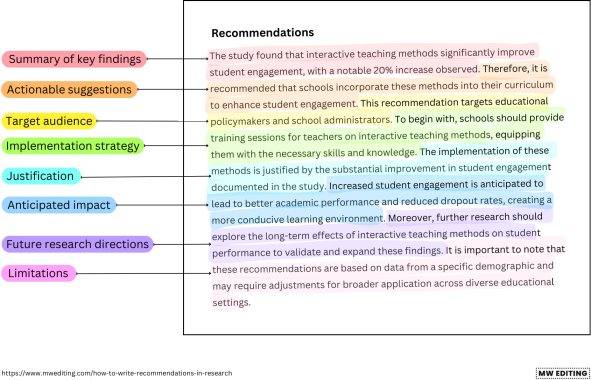
Summary of key findings
The summary of key findings provides a brief overview of the study’s main results, which form the basis for the recommendations. This ensures that readers understand the context and rationale behind the recommendations.
Example: The study found that interactive teaching methods significantly improve student engagement.
Actionable suggestions
This section offers specific, clear and practical actions that can be implemented based on the findings. Actionable suggestions provide a clear path for stakeholders to follow, making the recommendations practical and feasible.
Example: Schools should incorporate interactive teaching methods into their curriculum to enhance student engagement.
Target audience
The target audience identifies who the recommendations are intended for, such as policymakers, practitioners or researchers. This section ensures that the recommendations are relevant and directed at those who can act on them.
Example: This recommendation is aimed at educational policymakers and school administrators.
Implementation strategy
The implementation strategy in the recommendations suggests ways to implement them, including steps, needed resources and potential challenges. It helps stakeholders understand how to apply the recommendations practically.
Example: Schools can start by providing training sessions for teachers on interactive teaching methods.
Justification
Justification explains why the recommendations are important and how the study’s findings. It provides credibility and rationale, convincing stakeholders of the value of the recommendations.
Example: Implementing interactive teaching methods is justified by the observed 20% increase in student engagement in the study .
Anticipated impact
Anticipated impact describes the expected outcomes or benefits of implementing the recommendations. This section highlights the potential positive effects, encouraging stakeholders to adopt the recommendations.
Example: Increased student engagement is expected to lead to better academic performance and reduced dropout rates.
Future research directions
Future research directions suggest areas for further investigation that can build on the current study’s findings. They help advance the field by identifying gaps and opportunities for future studies.
Example: Further research should explore the long-term effects of interactive teaching methods on student performance .
Limitations
This section acknowledges any limitations of the study and how they might affect the recommendations. It provides a balanced view, helping stakeholders understand any potential constraints.
Example: These recommendations are based on data from a specific demographic and may need adjustment for broader application .
- Be clear and concise : Avoid vague language. Your recommendations should be easy to understand. For instance, instead of saying ‘improve educational practices,’ specify ‘implement interactive teaching methods in middle school mathematics classes.’
- Prioritise recommendations : If you have multiple recommendations, prioritise them based on their potential impact and feasibility. For instance, ‘First, schools should integrate interactive teaching methods, and second, they should continuously train teachers to use them effectively.’
- Align with objectives : Ensure your recommendations align with the study’s initial objectives. For example, if the study aimed to enhance student engagement, focus recommendations on methods proven to increase engagement.
- Consider stakeholder perspectives : Think about how different stakeholders (e.g. educators, policymakers, students) will be affected by your recommendations. For instance, highlight the benefits for students to gain support from educators and policymakers.
- Use evidence : Support your recommendations with data and evidence from your study. Use statistics, data and other tangible examples to support your recommendations.
- Anticipate challenges : Acknowledge potential challenges or barriers to implementation and suggest ways to overcome them.
- Be realistic : Ensure that your recommendations are realistic and achievable within the given context.
Example 1: Education
The study demonstrated that incorporating project-based learning (PBL) significantly enhances critical thinking skills and student engagement in high school social studies classes. Therefore, it is recommended that high schools adopt PBL methodologies within their social studies curricula to foster these skills. This recommendation targets educational policymakers, school administrators, and social studies teachers. To implement this, schools should provide professional development workshops to train teachers in PBL techniques and allocate resources for necessary materials and support.
The justification for this recommendation is based on the observed 25% increase in critical thinking skills and 20% rise in student engagement in classes that used PBL (Doe, 2023). The anticipated outcomes include higher student engagement, improved critical thinking skills, and better academic performance. Future research should explore the long-term impacts of PBL on student outcomes across various subjects. These recommendations are based on data from urban high schools and may require adjustments for different educational contexts.
Example 2: Health care
Our study found that the use of electronic health records (EHR) significantly improves patient care coordination and reduces medication errors in outpatient clinics (Smith & Brown, 2023). It is recommended that outpatient clinics implement EHR systems to enhance the quality of care. This recommendation is aimed at healthcare administrators, policymakers, and IT managers in the healthcare sector. Implementation strategies should include investing in EHR infrastructure, offering comprehensive training for medical staff, and developing supportive policies to facilitate the adoption of EHRs.
The research indicated a 30% reduction in medication errors and a 40% improvement in care coordination (Smith & Brown, 2023), justifying the need for widespread EHR implementation. Improved patient care coordination is expected to lead to better health outcomes and increased patient satisfaction. Further research should assess the long-term benefits of EHR systems in different healthcare settings. These recommendations are based on data from outpatient clinics and may need adaptation for other healthcare environments.
Example 3: Environmental science
The research indicated that the implementation of green infrastructure, such as bioswales and green roofs, plays a crucial role in mitigating urban flooding and improving water quality (Johnson 2023). Therefore, it is recommended that urban planners and municipal governments integrate green infrastructure into city planning to address these issues. This recommendation is directed towards urban planners, municipal governments, and environmental policymakers. To implement this, cities should incorporate green infrastructure projects into urban development plans and provide incentives for private developers to include green infrastructure in new constructions.
The data showed a 15% reduction in urban flooding incidents and significant improvements in water quality where green infrastructure was implemented (Johnson 2023). Anticipated outcomes include reduced urban flooding, enhanced water quality, and improved urban resilience to climate change. Future studies should explore the cost-effectiveness and long-term environmental benefits of green infrastructure in various climatic regions. These recommendations are based on data from temperate climates and may require modifications for different environmental conditions.
Example 4: Business
The study found that the implementation of corporate social responsibility (CSR) initiatives leads to increased consumer loyalty and brand trust in the retail sector (Adams and Clark 2023). It is recommended that retail companies adopt comprehensive CSR strategies to enhance their market position. This recommendation is aimed at corporate executives, marketing managers, and business strategists. To implement CSR initiatives effectively, companies should integrate them into their core business strategies, engage stakeholders, and communicate their CSR efforts transparently.
The findings demonstrated a 20% increase in consumer loyalty and a 25% rise in brand trust among companies with strong CSR programs (Adams and Clark 2023). The expected outcomes include improved consumer loyalty, enhanced brand reputation, and increased market competitiveness. Future research should examine the long-term impacts of CSR initiatives on financial performance and consumer behaviour in various industries. These recommendations are based on data from the retail sector and may require adjustments for other business contexts.
Professional editing services can significantly enhance the quality and clarity of your research recommendations, making them more compelling and suitable for publication. Here is how different types of editing services can assist:
Proofreading
Proofreading focuses on correcting surface errors such as grammar, punctuation, spelling and formatting issues. It ensures your recommendations are free from typos and grammatical errors, enhancing readability and professionalism. Moreover, it maintains consistent terminology and formatting throughout your document, which is particularly important in academic writing.
- Before: ‘Incorporate interactve teaching methods to enhnace student engagement.’
- After: ‘Incorporate interactive teaching methods to enhance student engagement.’
Copyediting
Copyediting involves a thorough review of the text to correct grammar, punctuation, syntax and usage errors, as well as ensuring consistency in style and tone. It improves the clarity and flow of your recommendations, making them easier to understand. Furthermore, it ensures your recommendations adhere to the specific formatting guidelines of the journal or publisher.
- Before: ‘Schools should implement interactive teaching methods they should also train teachers.’
- After: ‘Schools should implement interactive teaching methods and also provide training for teachers.’
Line editing
Line editing focuses on the content, style and language of each line. It looks at word choice, sentence structure and the overall effectiveness of the language used. It refines sentence structure and word choice to make your recommendations more engaging and impactful. In addition, it ensures your recommendations are clearly articulated and persuasively presented.
- Before: ‘Interactive teaching methods are good because they make students more engaged.’
- After: ‘Interactive teaching methods significantly increase student engagement, fostering a more dynamic and effective learning environment.’
Developmental editing
Developmental editing addresses the big picture of your manuscript. It involves evaluating the structure, organisation and content to ensure that your research is effectively communicated. Developmental editing helps organise your recommendations in a logical and coherent manner, ensuring each suggestion builds on the previous one. It also provides detailed feedback on the overall structure and effectiveness of your recommendations, identifying any gaps or areas for improvement.
- Before: ‘Recommendations: 1. Use interactive methods. 2. Train teachers. 3. Improve student engagement.’
- After: ‘Based on our findings, we recommend the following: First, schools should integrate interactive teaching methods into their curriculum to enhance student engagement. Second, comprehensive training programs should be implemented so that teachers can effectively utilise these methods. Last, continuous assessment should be conducted to monitor and further improve student engagement.’
University writing centres and libraries
- Purdue Online Writing Lab (OWL) offers extensive guides on academic writing, including how to structure and write recommendations in research papers.
- Harvard College Writing Center provides tips and strategies for writing various sections of research papers, including recommendations.
- University of Southern California Libraries offer detailed guides on writing research recommendations and other sections of academic papers.
Academic books and journals
- The Craft of Research by Wayne C. Booth, Gregory G. Colomb and Joseph M. Williams is a comprehensive guide to conducting and presenting research, including writing effective recommendations.
- How to Write a Lot: A Practical Guide to Productive Academic Writing by Paul J. Silvia offers practical advice for academic writing, including structuring recommendations.
- Writing for Social Scientists: How to Start and Finish Your Thesis, Book, or Article by Howard S. Becker provides insights into writing and revising academic work, including recommendations.
Online courses and workshops
- Coursera offers courses on academic writing and research methods that include sections on writing recommendations.
- edX provides courses on writing and publishing in academia, often covering how to formulate recommendations.
- FutureLearn offers online courses on academic writing, including how to structure research papers and write effective recommendations.
Key takeaways
The recommendations in research are crucial for providing actionable suggestions based on the study’s findings aimed at practitioners, policymakers and researchers who will take direct action. It plays a significant role in translating research results into practical applications, policy changes and suggestions for further research. The primary purpose of the recommendations section is to guide how findings can be applied in real-world scenarios, helping practitioners and professionals implement new strategies, techniques or interventions while advising policymakers on potential changes or considerations. Furthermore, this section identifies gaps and suggests areas for further investigation, guiding future researchers and advancing the field of study. It also acknowledges the study’s limitations and proposes ways to address them in future research, thus enhancing the reliability and validity of subsequent studies.
I am an editor and indexer working with academic writers, journals and presses. If your academic manuscript needs a second pair of eyes, contact me for a free sample edit (and remember to use my early bird discount ).
I'm a freelance editor and indexer with a PhD in literary history. I work with non-fiction, academic and business texts.
Memberships

Incorporated in England and Wales. Company number: 10809565. Registered office: 124 City Road, London, England, EC1V 2NX
© MWEditing 2023
- Dissertation Proofreading and Editing
- Dissertation Service
- Dissertation Proposal Service
- Dissertation Chapter
- Dissertation Topic and Outline
- Statistical Analysis Services
- Model Answers and Exam Notes
- Dissertation Samples
- Essay Writing Service
- Assignment Service
- Report Service
- Coursework Service
- Literature Review Service
- Reflective Report Service
- Presentation Service
- Poster Service
- Criminal Psychology Dissertation Topics | List of Trending Ideas With Research Aims
- Cognitive Psychology Dissertation Topics | 10 Top Ideas For Research in 2025
- Social Psychology Dissertation Topics | 10 Latest Research Ideas
- Top 10 Clinical Psychology Dissertation Topics with Research Aims
- Educational Psychology Dissertation Topics | 10 Interesting Ideas For Research
- Customer Service Dissertation Topics | List of Latest Ideas For Students
- 15 Interesting Music Dissertation Topics
- Business Intelligence Dissertation Topics | List of Top Ideas With Research Aims
- Physical Education Dissertation Topics | 15 Interesting Title Examples
- 15 Top Forensic Science Dissertation Topics with Research Aims
- Islamic Finance Dissertation Topics | List of 15 Top Ideas With Research Aims
- Dissertation Examples
- Dissertation Proposal Examples
- Essay Examples
- Report Examples
- Coursework Examples
- Assignment Examples
- Literature Review Examples
- Dissertation Topic and Outline Examples
- Dissertation Chapter Examples
- Dissertation Help
- Dissertation Topics
- Academic Library
- Assignment Plagiarism Checker
- Coursework Plagiarism Checke
- Dissertation Plagiarism Checker
- Thesis Plagiarism Checker
- Report Plagiarism Checke
- Plagiarism Remover Service
- Plagiarism Checker Free Service
- Turnitin Plagiarism Checker Free Service
- Free Plagiarism Checker for Students
- Difference Between Paraphrasing & Plagiarism
- Free Similarity Checker
- How Plagiarism Checkers Work?
- How to Cite Sources to Avoid Plagiarism?
- Free Topics
- Get a Free Quote

- Report Generating Service
- Model Answers and Exam Notes Writing
- Reflective or Personal Report Writing
- Poster Writing
- Literature Review Writing
- Premier Sample Dissertations
- Course Work
- Cognitive Psychology Dissertation Topics
- Physical Education Dissertation Topics
- 15 Top Forensic Science Dissertation Topics
- Top 10 Clinical Psychology Dissertation Topics
- Islamic Finance Dissertation Topics
- Social Psychology Dissertation Topics
- Educational Psychology Dissertation Topics
- Business Intelligence Dissertation Topics
- Customer Service Dissertation Topics
- Criminal Psychology Dissertation Topics

- Literature Review Example
- Report Example
- Topic and Outline Examples
- Coursework Example

- Coursework Plagiarism Checker
- Turnitin Plagiarism Checker
- Paraphrasing and Plagiarism
- Best Dissertation Plagiarism Checker
- Report Plagiarism Checker
- Similarity Checker
- Plagiarism Checker Free
- FREE Topics
Get an experienced writer start working
Review our examples before placing an order, trusted by 20,000+ happy students, how to write recommendations: do’s and don’ts..

How to Write Citation? | A Practical Guide for Citation and References

How to Write References Quickly and Accurately? | A Practical Guide

Writing research recommendations involves suggesting future research directions or actions that can be taken based on the findings of a research study. The most crucial element of the analysis process, recommendations, is where you provide specific suggestions for interventions or solutions to the problems and limitations found throughout the assessment.
Explore New Dissertation Ideas
Find Current Dissertation Examples
The following guideline will help you explore how to write recommendations :
What are the Recommendations?
Research recommendations are suggestions for future research based on the findings of a research study. The researcher may make these recommendations, or they may be requested by the publisher, funding agency, or other stakeholders who have an interest in the research. The purpose of research recommendations is to identify areas where further investigation is needed and to provide direction for future research in the field.
Get Help Through Our Proofreading Editing Services
The recommendation section, whether it is included in the discussion section or conclusion, should involve the following:
- The research questions that the recommendation addresses.
- A concise summary of the findings from the research.
- The implications of the findings for practice.
- The strengths and limitations of the research.
- How do the findings relate to other research in the field?
- Recommendations for further research.
You can choose any research topic from the given list, just contact us at WhatsApp or email .
3-Step Dissertation Process!

Get 3+ Topics

Dissertation Proposal

Get Final Dissertation
What kind of recommendations are appropriate.
The appropriateness of recommendations depends on the research study and the research field. Generally, research recommendations should be based on the findings of the study and should address research gaps or limitations. Here are some types of recommendations that may be appropriate:
Finalise Your Topic After Getting Inspired by the Current Research Topics
1- Further Investigations
Suggest further investigations into specific research questions or hypotheses. This can include exploring new variables, testing different methods, or using different samples.
2- Development of New Research Methods or Techniques
Propose new research methods or techniques that can be used to address research questions or improve the quality of research.
3- Replication of the Study
Recommend replication of the study with larger or more diverse samples to increase the generalizability of the findings.
4- Extension of the Study
Suggest extending the study to different populations or contexts to explore the generalizability of the findings.
5- Collaboration with Other Researchers
Recommend collaboration with other researchers or research teams to leverage expertise and resources.
6- Integration of the Study Findings into Policy or Practice
Suggest ways in which the study findings can be used to inform policy or practice in the relevant field.
7- Addressing Limitations or Gaps in the Current Research Literature
Propose ways the study findings can address limitations or gaps in the current research literature.

Testimonials
Very satisfied students
We want to make all students happy, every day. Review us on Sitejabber
Get a Dissertation Proposal
Start your dissertation writing process with experts
Safe and confidential process Free custom topics to choose from Any deadline Unlimited free amendments Free anti-plagiarism report Money-back guarantee

Structuring of Recommendations
When learning how to write recommendations, start with structuring the recommendations section.
1- Summarize your Research Findings
Before making any recommendations, briefly summarise your study's key findings. This will provide context for your recommendations and ensure that they are relevant to the research topic.
2- Identify Research Gaps
Based on your research findings, identify gaps in the literature or areas requiring further investigation. Consider the limitations of your study and the potential implications of your findings.
3- Prioritize Recommendations
Determine the most important recommendations based on their potential impact and feasibility. You may want to organize your recommendations into short-term and long-term goals.
4- Provide Clear and Specific Recommendations
Your recommendations should be concise and specific. Avoid vague or general statements and provide actionable steps that can be taken to address the research gaps you have identified.
5- Justify Your Recommendations
Provide a rationale for each of your recommendations, explaining why they are necessary and how they will contribute to the overall research field.
6- Consider Potential Challenges
Be sure to consider potential challenges or limitations that may arise in implementing your recommendations. Provide suggestions for overcoming these challenges where possible.
7- Conclude with a Summary
End your recommendations with a brief summary of your main points. This will help reinforce the importance of your recommendations and ensure they are clearly understood.
Find Interesting Research Proposal Examples Here
Remember to tailor your recommendations to your specific research study and field of study. Keep in mind that your recommendations should be based on evidence and have practical applications for researchers, practitioners, or policymakers.
Building Concrete Research Recommendations
- The research process should be systematic and logical.
- Conduct the research in an objective and unbiased manner.
- The research findings should be reproducible.
- The research recommendations should be made with a concrete plan in mind.
- The research recommendations should be based on a solid foundation of evidence.
- The research recommendations should be clear and concise.
- The research recommendations should be achievable and realistic.
- The research recommendations should be made to further the research project's goals.
- They should be made to improve the quality of the research project.
- The research recommendations should make the research project more efficient.
- The recommendations should make the research project more effective.
- The research recommendations must aid in making the research project more successful.
Get an Immediate Response
Discuss your requirements with our writers for research assignments, essays, and dissertations.
WhatsApp Us
What is the Smart Strategy for Writing Research Recommendations?
In academic writing, there are generally three types of Recommendations:
- Obligations
Explore Some Best Dissertation Writings Here
Recommendations can be further characterized as "SMART" or "non-SMART." A SMART Recommendation is one that is Specific, Measurable, Actionable, Realistic, and Time-bound. The following sections will provide more information on each of these characteristics.
- A Recommendation is " Specific " if it clearly spells out what actions need to take place, who needs to take those actions, and when they need to occur.
- A Recommendation is " Measurable " if specified indicators can be used to gauge whether it has successfully achieved its objectives.
- A Recommendation is " Actionable " if the necessary steps required to implement the recommendation are spelt out and achievable.
- A Recommendation is " Realistic " if it is achievable given the available resources (e.g., time, money, human resources).
- Finally, a Recommendation is " Time - bound " if there is a specified timeframe within which the recommendation should be achieved.
How Does It Work ?

Fill the Form
Please fill the free topic form and share your requirements

Writer Starts Working
The writer starts to find a topic for you (based on your requirements)

3+ Topics Emailed!
The writer shared custom topics with you within 24 hours
What are the Dos and Don'ts of Research Recommendations?
1- be specific.
Provide clear and specific recommendations that are relevant to the research study and the field of study. Use precise language and avoid vague or general statements.
2- Support Your Recommendations with Evidence
Base your recommendations on the research study's findings and other relevant literature. Provide evidence to support your recommendations and explain why they are necessary.
Identify and prioritise the most important recommendations based on their potential impact and feasibility.
4- Consider Practical Applications
Ensure that your recommendations have practical applications for researchers, practitioners, or policymakers. Think about how your recommendations can be implemented in practice and how they can contribute to the field.
5- Be Concise
Keep your recommendations concise and to the point. Avoid unnecessary details or explanations.
6- Provide a Rationale
Explain the rationale for each of your recommendations and how they will contribute to the overall research field.
1- Make Unsupported Claims
Avoid making claims that are not supported by evidence. Make sure that your recommendations are based on the research study's findings and other relevant literature.
2- Overgeneralize
Avoid overgeneralizing your recommendations. Make sure that your recommendations are specific to the research study and field.
3- Ignore Potential Challenges
Consider potential challenges or limitations that may arise in implementing your recommendations. Provide suggestions for overcoming these challenges where possible.
4- Disregard Practical Considerations
Ensure that your recommendations are practical and feasible. Consider the resources and constraints of the research field and how your recommendations can be implemented in practice.
5- Be Too Prescriptive
Avoid being too prescriptive in your recommendations. Provide guidance and direction, but allow room for interpretation and adaptation.
By following these dos and don'ts, you can ensure that your research recommendations are well-supported, relevant, and practical and will make a meaningful contribution to the research field.
Learn the Best Way to Write Acknowledgements
Explore the Current Samples of Acknowledgement
It is frequently the case that further research is needed to facilitate the advancement of a study. In your research plans, you can analyze potential study methodologies and the points regarding a subject that might be covered in such research.
The recommendations you include in your paper could be crucial to your research. Make sure your essay has clear recommendations that are simple to implement, can be used effectively, and are not unduly complex or challenging in any other manner. If you need further help writing recommendations, contact us via email or web chat.
Get 3+ Free Recommendations Dissertation Topics within 24 hours?
Your Number
Academic Level Select Academic Level Undergraduate Masters PhD
Area of Research
admin farhan
Related posts.

Dissertation Interview Questions | Everything You Need To Know

Conducting Interviews for Your Dissertation | A Comprehensive Guide

What is Gibbs’ Reflective Cycle and How Can It Benefit You? | Applications and Example
Comments are closed.

IMAGES
COMMENTS
Mar 26, 2024 · Importance of Research Recommendations. Including recommendations in a research report or thesis is essential for: Bridging the gap between research findings and practical applications. Guiding future studies to build on the current research. Providing stakeholders with insights for decision-making and policy formulation.
Sep 15, 2022 · Recommendations for future research should be: Concrete and specific; Supported with a clear rationale; Directly connected to your research; Overall, strive to highlight ways other researchers can reproduce or replicate your results to draw further conclusions, and suggest different directions that future research can take, if applicable.
Mar 26, 2024 · Future research, also known as recommendations for further study, is an essential section in a thesis that outlines areas where additional investigation is needed. This section acknowledges the limitations of the current research and proposes directions for future inquiry, helping to advance knowledge in the field.
Your dissertation needs to include suggestions for future research. Depending on requirements of your university, suggestions for future research can be either integrated into Research Limitations section or it can be a separate section. You will need to propose 4-5 suggestions for future studies and these can include the following: 1. Building upon findings of your research. These may relate ...
Jan 24, 2024 · The key components of research recommendations include defining the research question or objective, specifying research methods, outlining data collection and analysis processes, presenting results and conclusions, addressing limitations, and suggesting areas for future research. Here are some characteristics of research recommendations:
Jul 12, 2024 · The ultimate goal of any research process is not just to gather knowledge, but to use that knowledge to make a positive impact. This is where recommendations come in. A well-written recommendations section in your research study translates your findings into actionable steps and guides future research on the topic.
Mar 28, 2023 · Basic differences between implications and recommendations in research. Implications and recommendations in research are two important aspects of a research paper or your thesis or dissertation. Implications discuss the importance of the research findings, while recommendations offer specific actions to solve a problem.
Jun 28, 2024 · Research recommendations are a section of a research paper where the author suggests specific actions, areas for further study or changes in practice based on the findings of the research. These recommendations are intended to guide future research, inform policymakers, practitioners or other stakeholders and contribute to the advancement of ...
Jun 12, 2024 · This section is essential for translating research results into practical applications, policy changes or directions for future research. Purpose. The recommendations section in research papers and other academic texts serves multiple critical purposes and holds significant importance.
Oct 26, 2022 · The researcher may make these recommendations, or they may be requested by the publisher, funding agency, or other stakeholders who have an interest in the research. The purpose of research recommendations is to identify areas where further investigation is needed and to provide direction for future research in the field.